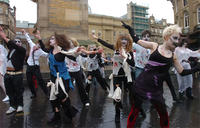-
Industry displays unmanned systems to law maker
Of the 19,000 law enforcement agencies in the United States, only about 300 have aviation units; most law enforcement agencies cannot afford several million dollars for a helicopter, as well as the $1,500 per hour to operate it; UAVs offer a cost-effective solution
-
-
NYPD has means to take down a plane "in very extreme situation"
The NYPD created a counterterrorism unit following the 9/11 attacks; New York City Police Commissioner Ray Kelly said that the counterterrorism unit has the means to take down an aircraft “in a very extreme situation”
-
-
Study shows surveillance cameras reduce crime, in some cases

A recent study found that security cameras in urban areas have had mixed results in preventing crime; the study aimed to determine whether installing surveillance cameras to reduce crime is an effective use of scarce resources, especially with states struggling with soaring budget deficits and police departments facing steep cuts; the study found that the efficacy of cameras varies and is largely dependent upon how the surveillance system is set up and monitored
-
-
Aussies want license plate-readers connected to drones
Canberra law enforcement authorities want to begin using UAVs together with license plate readers to track, autonomously, vehicles of interest; the police is considering using speed-detection systems to detect stolen cars or unregistered vehicles — and even integrate them into a broader surface-to-air surveillance network
-
-
Security professionals gear up for GovSec West
Security professionals from across the country are slated to descend upon Phoenix, Arizona for the GovSec West security conference in November; attendees will have the opportunity to participate in educational sessions that focus on securing critical infrastructure, cyber threats, terrorism, and border security
-
-
The Certified Protection Officer (CPO) 8th Edition launched
The updated version of a training course for Certified Protection Officers is now available online; the course and exam provide candidates with the IFPO certification; the course offers training in security technology, laws, trends, and techniques
-
-
To catch a "flash mob"

Catching “flash mobs” has proven to be particularly troublesome for local police officers as they occur and then dissipate so rapidly, but now local authorities are receiving some extra help from DHS
-
-
Ogden, Utah police first-in-nation to use surveillance blimp

A patrol car fitted with all of the police extras cost $40,000; a surveillance blimp will cost well below that — possibly as low as $15,000; after that, it is $100 a week to keep it filled with helium and charge its electric batteries; the police in Ogden, Utah, decides this is a good deal
-
-
Challenging conventional wisdom on border security
Two new papers say that if the United States is serious about border security, then instead of building bigger walls or throwing more resources at empty enforcement efforts, the United States should adopt strategies that address real threats to U.S. border security — drug cartels
-
-
Can citizens legally -- and secretly -- record police officers in action?
Technological advances have raised questions concerning the constitutionality of new police methods (for example, attaching a GPS device to a suspect car without the police first obtaining a warrant to do so); there are legal issues on the other side of the equation — that is, whether or not citizens are constitutionally protected when doing video or audio recording of police officers in action
-
-
New vest offers GPS tacking and other information
Canadian company Laipac Technology is showing its S911 GPS Vest which the company describes as “a high coverage assault protection designed for military, tactical law enforcement and VIP personnel that demand the highest protection.”
-
-
Detroit police disarm IED found in restaurant
On Sunday, an improvised explosive device was found in the restroom of a Detroit restaurant; police confirmed that it was a bomb and successfully disarmed it
-
-
Expert questions DHS grants for rural communities following 9/11

In the decade since 9/11, the U.S. government has poured more than $1.3 million into the rural community of Ross County, Ohio, which some argue is a waste of federal resources; the funds were ostensibly designed to prevent terrorism, but much of the money has been spent to bolster emergency response capabilities in the event of a major disaster whether it be natural or manmade
-
-
Researchers show facial-reading lie-detector

New lie detecting system records subtle clues that people give off when lying, such as increased blood flow around the eyes, tiny lip movements, or nose twitching; one of the major selling points of such technology would be its use in situations where the person being targeted does not know they are being tested
-
-
NYPD remains on high-alert following 9/11

Officials in New York remain on high-alert following the warning issued by DHS that terrorists might be plotting an attack on the city for the ten-year anniversary of 9/11; NYPD have pulled back the additional security measures put in place for the ten-year anniversary like checkpoints at ports of entry and bridges, but remain on vigilant for a potential bomb attack
-
More headlines
The long view
How Male Grievance Fuels Radicalization and Extremist Violence
Social extremism is evolving in reach and form. While traditional racial supremacy ideologies remain, contemporary movements are now often fueled by something more personal and emotionally resonant: male grievance.
